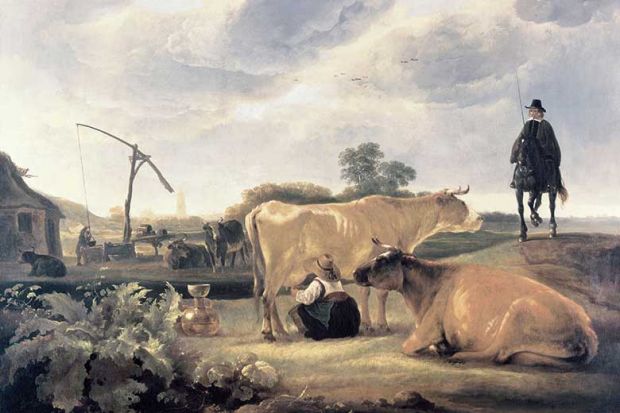Dairy cows mattered to people in early modern England, we read, “in every possible way”. Their milk, butter and cheese provided a vital supplement for sparse diets, and they lived and worked alongside human beings for many years. Farmers’ wives, daughters and dairymaids in rural communities “leaned up against a cow’s flank twice a day, day-in, day-out”, conscious of her health and changing moods.
Erica Fudge builds on a discussion of how people thought about their farm animals to consider the “intertwined lives of people and livestock”, where both animals and humans have characters and agency. Her main source is a large dataset of more than 4,000 wills from rural Essex, compared briefly with 2,000 wills from the City of London and Middlesex, covering the years 1620-34.
She deliberately avoids a chronological framework that would have meant nothing to animals, choosing a span of 15 years that “mirrored the productive life of an early modern dairy cow”.
Through discussion of how animals are bequeathed in wills, Fudge suggests something of the cooperative and affective relationships between animals and human beings. There are illuminating treatments of pigs, lambs and bees, but the cows of Essex are at the heart of the book. Horses and cows were more likely than other animals to be given precise, detailed descriptions beyond mere listing of their age and sex, as when a West Bergholt man left a daughter “my great northen Cowe” and a son “my little black northen cowe & my cowe called Shaler”. Naming animals was a signal of physical recognition and emotional engagement: Phoebe Thresher’s bequests included cows named “high-horne”, “blackbird” and “sawen horne”.
There was no contradiction between affection and profit. More uncomfortably, it was cows’ love for their calves, and their willingness to cooperate with the women who milked them, that made them profitable; a cow’s “unquietness” was always troubling. Early modern relationships combined affection, pragmatism and, on the part of humans, a recognition of the mortality shared by all God’s creation. An Essex widow instructed her executors to sell her two old cows in order that two young ones could be provided for her children. The old cows were sold for slaughter, so from milk providers they became meat, yet their owner had not sold them in her lifetime.
Fudge contrasts rural acceptance of slaughter as necessary but difficult with both the greater “species isolation” revealed in the contemporary London wills and the paradoxes of modern animal studies that argue for a reciprocal social contract between animals and humans. Can we regard an animal as an “experiencing being who has skills, competences, and desires” and yet accept its slaughter for human benefit? While there can be no return to an early modern regime of negotiation and collaboration between species, Fudge insists on the importance of acknowledging “that such a way of being was once possible”.
I enjoyed this clear-sighted yet moving book, but I did wonder whether the source base was adequate to the always enterprising analysis. Only 10 per cent of the Essex wills (and less than 1 per cent of the London dataset) specifically mentioned animals, and only 27 of more than 700 cows are given names. This underlines the difficulty as well as the ambition of Fudge’s project.
Ann Hughes is professor of early modern history, emerita, at Keele University.
Quick Cattle and Dying Wishes: People and their Animals in Early Modern England
By Erica Fudge
Cornell University Press
264pp, £76.00 and £22.99
ISBN 9781501715075 and 5082
Published 15 September 2018
POSTSCRIPT:
Print headline: Cherished before slaughtered
Register to continue
Why register?
- Registration is free and only takes a moment
- Once registered, you can read 3 articles a month
- Sign up for our newsletter
Subscribe
Or subscribe for unlimited access to:
- Unlimited access to news, views, insights & reviews
- Digital editions
- Digital access to THE’s university and college rankings analysis
Already registered or a current subscriber? Login








